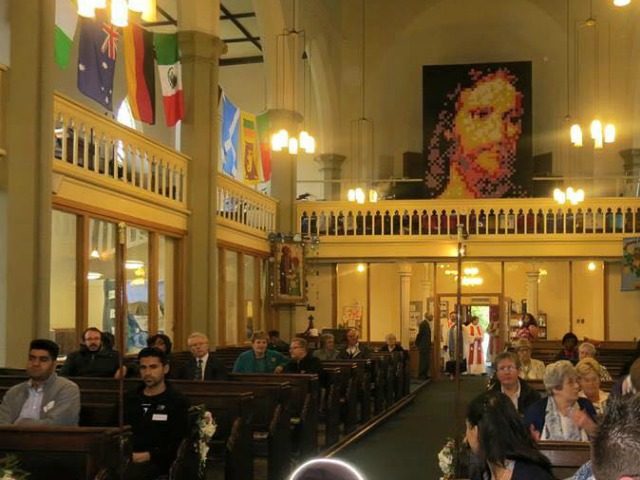A parish church in the English Midlands is converting three to four Muslim migrants to Christianity each week, simply by opening its doors and offering assistance to the newcomers. Many report having first been turned away from local mosques despite being homeless and in need.
On the face of it, St Mark’s church in Stoke-on-Trent is a typical English parish church. But over the last three years it has undergone something of a transformation into a refugee processing centre, presided over by Rev Sally Smith.
Committed to acting out her faith, Rev Smith has in some cases housed asylum seekers in her own home, given them food, furnished them with clothes, bought shoes for their children, and looked after their medical requirements. Food parcels are handed out twice a week, language lessons are on offer, and the recipients are given the bus fare, if needs be.
The result has been a wave of conversions to Christianity, as many as three or four a week on average.
“With the mass movement from across the world we have got people of faith coming into secular society and faith really matters to them,” Rev Smith told the Guardian. “And they are not too bothered, as bothered as we may think, about how that faith is expressed.
“In our secular mindsets we have all these great divides from different faiths but what I am finding is that they don’t conform to these divides and they just want to come to a place of worship, whatever that place is – they don’t seem to distinguish as much as we would have expected them to. Our help that we offer is in no way related to converting them. The most important thing for me is for people to be able to pray in our church whatever their faith.”
On a recent Saturday afternoon, the church played host to a mass baptism of 15 converts, all asylum seekers.
Abbas Massih, from Tehran, Iran, has only been in the UK for six months. He says he was only a Muslim as he was born in an Islamic country, but had been drawn to Christianity for some time. Back home, he was forced to hold Bible study meetings in secret. When the authorities found out, his pregnant wife was beaten, causing her to lose the baby.
“They welcomed me with an open heart at this church. It was not so much about the material help but about the emotional help that I received and it has made me feel connected to Jesus,” he said, speaking via an interpreter. “This religion is so much more accepting. In Christianity I feel peace.”
A Palestinian refugee who wanted to remain anonymous explained that even in the UK it was dangerous for former Muslims to admit to their conversion: “I kept it secret because some people may endanger my life. I am scared that I have changed my religion and what some people may do if they find out. They help every time and without asking for anything. The church has more money.
“One time I went to the mosque in London and I was homeless and it was snowing. I had spent five days in the street and I asked them to let me stay for just one or two hours. I did not ask them for anything, just somewhere to get warm, but they turned me away.”
Another Iranian migrant, Naziyar Morajabi, who has been in the UK for two years and has already been baptised, also expressed bitterness that local mosques were not interested in helping him.
“When I was homeless I went to the mosque and I asked them to let me stay for just two hours and to please give me some food,” he said. “I had nowhere to go. The leader of the mosque said I was not allowed to stay there as the mosque was not for sleeping in.”
But while the migrants appreciate Rev Smith’s stance, she admits it has alienated some within her original white British congregation.
“My biggest challenge has been the attitude of some of the people within the church,” she said. “I have had a lot of opposition. Criticism, negative attitudes and trying to undermine the work that we are doing – that’s from the white British congregation.
“I have lost lots of congregation members because of what has happened at the church. They don’t want the hassle and they don’t want the church being messed up. They see the church as having a very definite role and opening the doors to refugees isn’t one of them.”
She adds: “They expected a vicar’s role to be looking after the people inside the church and one of the insults often levelled at me is: ‘She cares more about the people outside the church than those inside.’ Well, this is what I am meant to be doing and you’re meant to be doing it with me. We should be doing this together.”

COMMENTS
Please let us know if you're having issues with commenting.